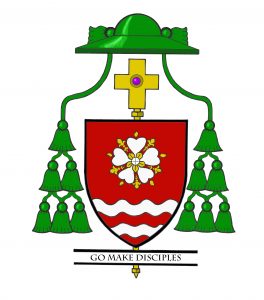Bishop Tylka shares hopes for ordination, explains motto in Catholic Post interview
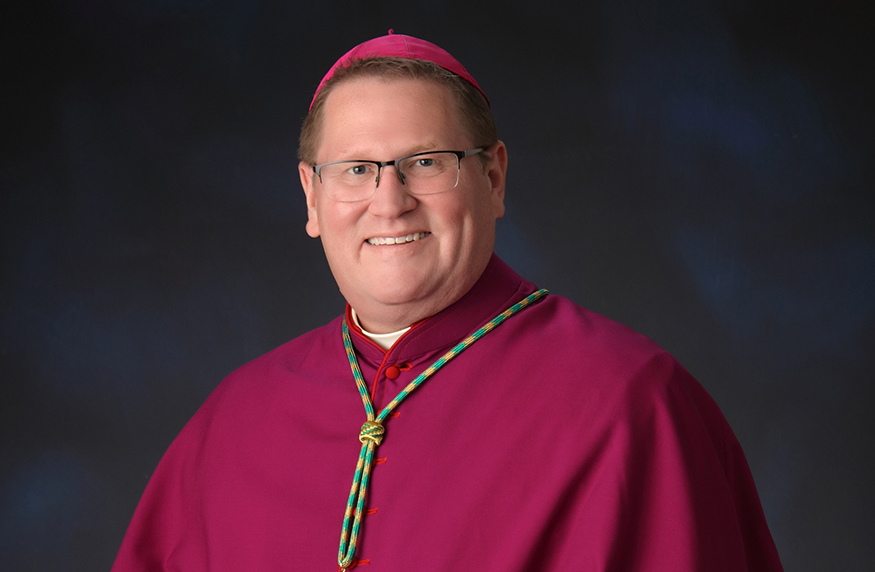
"This is home. This is where God has called me to be," said Coadjutor Bishop-elect Louis Tylka in a July 7 interview with The Catholic Post.
EDITOR’S NOTE — On July 7, just a few days after his move to Peoria from Tinley Park, Coadjutor Bishop-elect Louis Tylka sat for a second lengthy interview with The Catholic Post. The first was conducted by telephone in conjunction with his appointment announced on May 11. Following is the transcript of a conversation in his new office on the fourth floor of the Spalding Pastoral Center in Peoria, where he is just beginning to settle in.
—
What are your thoughts and mood as the day of ordination nears?
It’s coming up quickly. I have a lot of mixed feelings.
Having made the move to Peoria, there is still — as there always is — grieving in leaving a community.
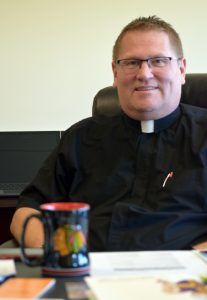
Coadjutor Bishop-elect Louis Tylka is pictured in his office on the fourth floor of the Spalding Pastoral Center in Peoria. The mug is evidence of his love for the Chicago Blackhawks hockey team. (The Catholic Post/Tom Dermody)
My life in June was consumed for the most part with my family, and my sister’s passing. (Bishop-elect Tylka’s sister, Mary Lou Bryant, died on June 13.) And so I lost a couple of weeks of preparation time — time to pack, time to purge before packing. But I gained a very grace-filled time to be with my family. Subsequently, I feel like my life in June was a roller coaster. I was grieving the loss of my sister, I was grieving the loss of my parish. And at the same time, I felt that I neglected my parish in some ways and that in the last month of leadership at St. Julie I wasn’t at my best — which everybody was more than gracious and understanding of.
One of my friends expressed feeling badly that I wasn’t able to, because of all that was going on, simply be happy and celebrate this new calling to be a bishop here in Peoria. I remember saying to that friend that I have my moments when I am celebrating. As goofy as it felt at times, I was running to get fitted for a cassock, or had an appointment with a jeweler who is designing my episcopal ring, and so I had those moments when I remembered “Yes, this is going on in my life and it’s exciting.” Then I would get back from that appointment and to the reality of my sister’s diminishing condition.
So I was able to celebrate and be joyful in episodes.
My last week and a half of June in Chicago was very overwhelming because it literally was throwing my life into boxes and getting ready to leave. For me, getting to Peoria, being able to start to get settled, the fact that I’m here . . . I’m much more able to focus on the reality of becoming a bishop, and becoming a bishop specifically for the church in Peoria. And that’s exciting.
Last Thursday was the first day in a month and a half that I was by myself. I was standing in a room filled with boxes that have to be unpacked. I remember taking a break and thinking “This is life now. This is home. This is where God has called me to be.” As much as I hate unpacking boxes, the fact that I could say “I’m here” brought a lot of peace. I don’t have a divided attention now. I’m not trying to run a parish and work for Cardinal Cupich and the Presbyteral Council, I am here to be Coadjutor Bishop of Peoria. At least for the moment I have one job, and one place. That’s kind of nice.
I realize for the next couple of weeks the excitement is all about the ordination. That’s just a moment. As I would tell couples getting married, your wedding day is a very important and sacred moment, but you are getting married, and that’s a lifetime commitment. It’s the same here. It’s going to be a wonderful celebration, but then it’s living as a bishop for the Diocese of Peoria.
What are your hopes for the day of your episcopal ordination?
My hope is that, especially because the Mass will be livestreamed, many more people will be able to participate virtually. My hope for the ordination itself is that it will be a powerful experience of prayer and certainly a powerful experience of the Holy Spirit for me as an individual, but more for the church.
My hope for the ordination itself is that it will be a powerful experience of prayer and certainly a powerful experience of the Holy Spirit for me as an individual, but more for the church . . . bringing us together in that moment, but also giving us guidance for the future.
We always look at how God is calling us to use our gifts and talents in the next phase of life. As much as it is about me, it’s much more about the diocese and how do we go forward. What’s the leadership that I’m supposed to bring? Discovering those answers have to be under the inspiration of the Spirit, and so I hope it’s a powerful experience of the Spirit bringing us together in that moment but also giving us guidance for the future.
We always look at how God is calling us to use our gifts and talents in the next phase of life. As much as it is about me, it’s much more about the diocese and how do we go forward. What’s the leadership that I’m supposed to bring? Discovering those answers have to be under the inspiration of the Spirit, and so I hope it’s a powerful experience of the Spirit bringing us together in that moment but also giving us guidance for the future.
What in your past has uniquely prepared you for being a bishop?
I can’t point to one moment in my life. I think life is a collection of moments. Every experience we have in our faith brings us to a deeper appreciation and a new experience of faith. I can’t say this experience at St. Michael’s, or this experience at Mater Christi, or this experience at St. Julie’s has prepared me to become a bishop. All of those experiences have helped to shape me as an individual, as a priest, as a disciple, and now specifically to bring to episcopal ministry.
When I get asked the question, “When did you know you wanted to be a priest?,” many times I say “This morning.” Every day you have to wake up and say, “God, what are you calling me to do today?” The layers of lived experience is what brings us to an appreciation for what we’re called to do in that moment.
How did you choose “Go Make Disciples” as your episcopal motto?
As more of a personal motto, I’ve always been attracted to the verse from the prophet Micah, Chapter 6, verse 8: “What does God ask of us but to act justly, love tenderly, and walk humbly with your God.” I have used that as a personal motto throughout my priesthood. It is inscribed on my chalice. I had stationery that had the words “Act justly, love tenderly, walk humbly.” One of the pieces of the music for the ordination is “We Are Called.”
So my first instinct was, “I’ve already got a motto.” That Scripture has been a guiding piece for me. But one thought was “That’s just too long for the ribbon underneath” (the coat of arms).
As I thought more about it, I thought about what my life especially over the last six years has entailed with the “Renew My Church” process in the Archdiocese of Chicago, which I was very fortunate to be a part of from its inception because of my role as chair of the Presbyteral Council. The more I thought about that, and what Pope Francis calls us to as missionary disciples, I thought this is what I feel I am called to do, what we’re all called to do. I have more of a focus on that reality than I’ve had in the first 19 years of my priesthood. Layered experiences of life, again, lead us to a clearer understanding of the calling for all of us who claim to be Christians of our responsibility to take up The Great Commission — as Jesus said, to “Go make disciples. . . .”
Define “disciple.” And what are the hallmarks of a missionary disciple?
A disciple is someone who is devoted to a lifelong relationship with Jesus Christ, which necessarily calls them to live the Gospel, live the teachings of Jesus. A missionary disciple is someone who is able to recognize that call and goes beyond that personal relationship that has to be nurtured and grown, into that next step of being sent by the Lord, by the church, to bring others into that same type of relationship. We have to encounter Jesus so that Jesus can transform our lives. And once our lives are transformed, we have to go out and transform other people’s lives.
What holds us back?
A lot of things. Fear. Insecurities. A sense of unworthiness. A sense of political correctness. As Catholics, many of us were not brought up to very intentionally and deliberately go out and talk about our faith. That’s a mentality that has to shift in the church.
In the movie “Field of Dreams,” there is the saying “If you build it, they will come.” A lot of the sense of what we were as a church was that if we built it, people would just come. People don’t come — not anymore. That’s not to say what we’ve built is bad in any way, it’s just that we have to go out from what we build so that people will recognize how important it is to come.
You have shown a sense of humor and a joyful spirit. How do you plan to maintain your joy even if you feel overwhelmed with responsibilities? How can Christians in general maintain joy when life seems overwhelming?
You have to remain grounded in the Lord. I need my time every morning to pray. When I rush into the day without taking the time, those tend to be days that are pretty hairy. Rooting myself in a life of prayer is important.
The other thing is that you have to maintain a mentality that there is always joy in the world, always hope in the world.
A number of years ago I had an employee who was always negative about everything. I remember getting fed up with his complaining. I listened to him, and at the end I walked out of the room and came back with a glass of water that was half full. And I said, “As far as I’m concerned, the glass is always half full. It’s never half empty. If you’re only going to look at it as being half empty, then we’re not going to be able to work together.”
It’s a silly story, but my point is that no matter how bad it gets in life, there is always still some good, some joy, some happiness, some sense of being loved. Those are things that nothing can take away from us.
I’m sure there will be difficult days being a bishop, but as far as I’m concerned there is always some reason to find joy and happiness and peace in your life, and not to lose that perspective.
What are your initial impressions of the Diocese of Peoria, and especially of Bishop Jenky?
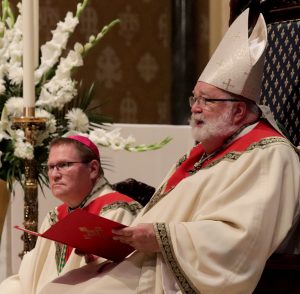
Coadjutor Bishop-elect Tylka looks on as Bishop Jenky presides at the ordination of two transitional deacons at St. Mary’s Cathedral on June 14. (The Catholic Post/Jennifer Willems)
Bishop Jenky has provided a wonderful welcome and encouragement. He has not yet pushed me in any way to take on responsibilities or duties. He has been very clear that I needed time to be with my family, to close up shop in Tinley Park, and then there’s the time to come to Peoria. He’s been very gracious every time I’ve talked with him. He called many times, especially in June, when my sister was not doing well, to check in and say “I’m praying for you.”
He’s been very encouraging about the diocese and speaks very highly about its good people, good priests, and religious. He’s been very reassuring.
My initial impression of the diocese is the people I’ve met have been very welcoming. The priests have been very encouraging and welcoming. I have a file folder that, since I’ve been named bishop, is being filled with letters and emails congratulating me and welcoming me. A good part of the letters in that folder are from folks of the diocese, parishioners from places I’ve never heard of. My impression is the people of God here are very welcoming.
The other impression is there is a lot of land!
How are you going to introduce yourself to the people and have the people introduce themselves to you?
I have not thought specifically of anything as an introduction. I know the ordination will be livestreamed. I know you are preparing the newspaper. And I know there are 12 Masses on my calendar beginning on the first weekend of August through October where I will be saying Mass in each of the vicariates. I know that’s my “welcome tour.”
I think this moment, both because of the pandemic and in general, is calling us to look at how we reach out to people. It’s not just the people who fill the pews when they’re able who need to hear about Jesus Christ and hear about the church and, in some small way, hear about their new bishop. We have to look at the opportunities we can create for communication to happen using the new technology, new media sources we can use.
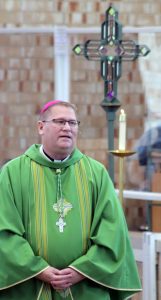
Bishop Tylka is shown June 28 during his final Sunday Mass as pastor of St. Julie Billiart Parish in Tinley Park. (The Catholic Post/Jennifer Willems)
I’m coming to the diocese that’s home for Fulton Sheen. He used the new media of his time to proclaim his faith in Jesus and the Gospel. Now, 70 years later, we have to use the new media of our time to do the same task. My task is the same task as his task, which is the same task for all of us, which goes back to what we were talking about: Jesus saying “Go make disciples.” Well, if you want to make disciples, you have to meet people where they’re at. How do we get the message out? That pulls me out of my comfort zone because I still don’t know how to do all of this (technology) stuff.
“Coadjutor.” How do you define that title, and what specific ways might you be assisting Bishop Jenky?
Bishop Jenky is the bishop of the Diocese of Peoria. My coming in an as a coadjutor bishop means I function mainly as an auxiliary bishop until the day comes that Bishop Jenky retires. The coadjutor status simply means that when that moment happens, I automatically assume the responsibility as the ordinary of the diocese. There is no rite of succession unless you have the designation of being a coadjutor.
When that happens there is no special ceremony, no installation Mass, there doesn’t need to be. It’s an automatic succession plan. So until that day, I function mainly as an auxiliary bishop to Bishop Jenky. He is still the chief shepherd of the diocese. We’re still operating under his vision.
This time affords me an opportunity to get to know the diocese. It allows me to have a better sense of who the church is in the Diocese of Peoria so it’s not that I come in from the outside and impose a vision of what it means to be the church without having a sense of what this church is. The Great Commission applies no matter where you are, but it has to be interpreted into the life of the local church. I have the luxury of having a mentor, of having someone who has been working on a vision for 18 years. And so I will assist him as best I can with the task that he designates to me as I learn both my role of what it means to be a bishop and being prepared to assume the responsibility of being an ordinary.
People ask if you are a liberal or conservative. Where would you tell them you are on the spectrum of left/right, traditional/progressive, or those kinds of church labels or boxes?
My first response is that labels are not helpful. Boxes are not good. I think that when we put people in boxes we tend to not let them out. And so, the danger is we lock people into a box that they no longer fit. I think the church is broad enough that whether you’re liberal or conservative or traditional or progressive, everyone has a home in the church. The better we do at trying to learn from each other, talk with each other, I think that’s the more complete vision of the church that we’re called to live.
I think Jesus didn’t come to talk about conservative and traditional versus liberal and progressive. Jesus came to talk about the Gospel which we all have to embody.
If we’re not willing to accept that there are people that think differently from us, but are still just as faithful and committed to following Jesus Christ, then I think we might be the ones that are less likely being faithful to following Jesus Christ.
I know I’ll be put in a box. I’m sure I’ve already been put in a box by some people. I know that because of some of the letters I’ve already received. It’s unfortunate, and I think it’s unnecessary, but for me I want to try to be as open to people no matter what part of the spectrum they want to call themselves. I think Jesus didn’t come to talk about conservative and traditional versus liberal and progressive. Jesus came to talk about the Gospel which we all have to embody.





